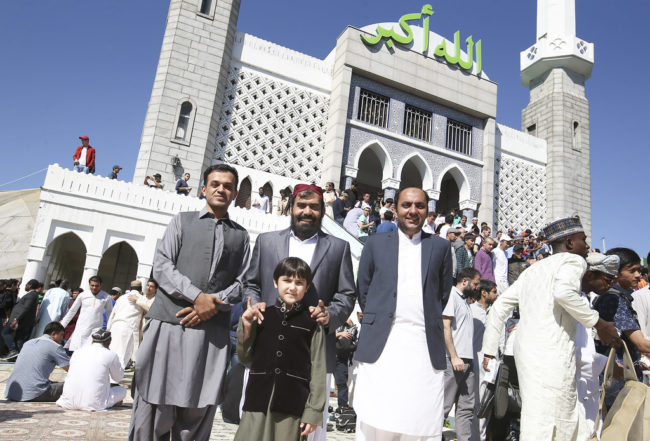SUNSET SATURDAY, AUGUST 10: Muslims worldwide express joyful appreciation for Ibrahim (Abraham) and his complete willingness to make a sacrifice during Eid al-Adha, the Feast of the Sacrifice.
Note: Dates and spellings vary. The Saudi Supreme Court recently announced that Eid al-Adha 2019 will fall on Sunday, August 11, with moon sightings varying by country. It’s estimated that, this year, Eid al-Adha will fall on August 10 in the United States; in the United Arab Emirates, Eid al-Adha will be August 11; in the United Kingdom, it will be celebrated August 12. Around the world, Eid celebrations last several days.
On the morning of Eid, crowds spill out of mosques, into open fields and in parks around the world, as Muslims celebrate both Ibrahim’s devotion and the miracle that took place on the sacrificial altar. Officially, Eid al-Adha begins after the descent of Mount Arafat by the pilgrims on Hajj in Mecca; Muslims across the globe gather with family and friends and offer prayers in congregation.
IBRAHIM, ISHMAEL AND THE MIRACLE AT THE ALTAR
Two joyous religious holidays are observed by all Muslims each year: Eid al-Fitr, ending the fasting month of Ramadan, and Eid al-Adha.
On the morning of Eid al-Adha, Muslims dress in their finest clothing and offer prayers in congregation. Following prayers, adherents exchange joyous greetings and give gifts (Eidi) to children. Visits are made, and even non-Muslims are invited to take part in the feasts and festivities.
According to Muslim tradition, when Ibrahim lowered his arm to slaughter his son, the Archangel Gabriel placed a ram on the altar in place of Ishmael. In commemoration, Muslims sacrifice an animal on Eid al-Adha, keeping one-third of the share; giving one-third to relatives and neighbors; and donating the remaining one-third to the poor.
THE ‘GREATER EID’
Sometimes called the Greater Eid (the Lesser Eid, Eid ul-Fitr, occurs at the end of Ramadan), Eid al-Adha calls able Muslims to sacrifice a halal animal. By sharing, it is ensured that even the most impoverished person may celebrate Eid. The animal sacrifice—which must meet specific age and quality requirements—may be performed anytime before sunset on the final day of Eid. Families that do not own an animal to slaughter contribute to a charity that will provide meat for the needy.
It is Islamic custom to exchange joyful greetings, present gifts to children and visit with family and friends during this joyous time. The events of Eid al-Adha last between one and four days, although in some regions, festivities carry on much longer.



Tell Us What You Think